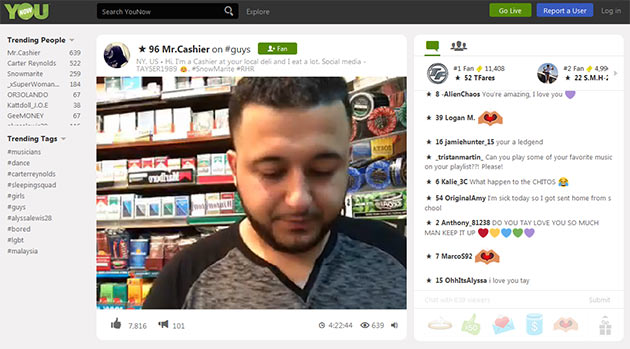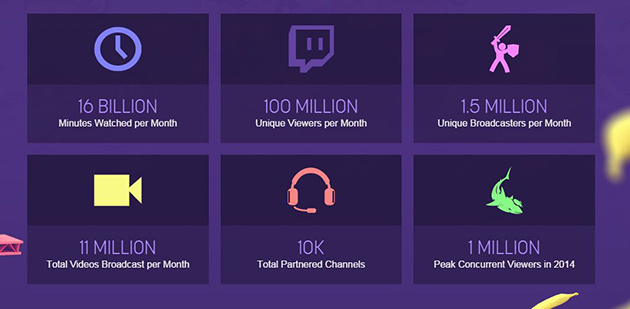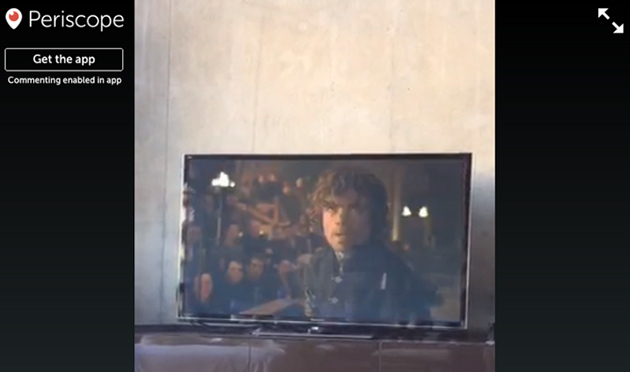Charles Byard
13 May 2015
Livestreaming: Meerkat, Periscope and the Competition
From elections to reflections, let’s have a look at two of the newest major players In the live streaming world and how they’re faring against the competition. Meerkat and Periscope.
Following the NHL’s decision to ban all forms of live streaming from inside National Hockey League venues, many were lead to wonder what prompted such a decision. How is it possible that two apps released little over two months ago have risen to such notoriety in the eyes of an organisation as large as NHL?
Live streaming isn’t anything new, in fact "Severe Tire Damage" were the first perform live on the internet way back in June 1993. Since then the market has become loaded with hundreds of separate live streaming platforms; broadcasting everything from live football to birdcams.
Amazon’s acquisition of video game streaming platform Twitch in August 2014 for a reported $970 (£585m) drew the attention of investors and spectators alike. Twitter’s purchase of Periscope for $100million in late march only reinforced the serious potential of live streaming apps. Meerkat themselves brought in $12m from the likes of Greylock Partners in March 2015. We’re talking about serious money for and industry thats in its infancy.

But I thought Periscopes were for submarines and Meerkats sold car insurance?
Periscope and Meerkat are lablled 'the closest thing to teleportation'. A way to broadcast live video from your phone over the internet to anyone in the world publicly or privately. Periscope users have the option to share over Twitter, Meerkat-'ers' have no choice, each stream is directly accessible to their Twitter following.
Twitter have denied Meerkat any access to their social graph in the wake of their Periscope purchase - An enormous setback to an company now facing an apparent attempt from Twitter to monopolise the market share.
It gets worse. Despite gaining 160,000 users in just a single month Meerkat have been outshone considerably by their competitor who drew in 1 million users in just 10 days. Admirably and despite the unfavoured odds Ben Rubin (Meerkat founder) and his fellow developers face, they have still managed to attract a user base now measuring over two million users. To say the least, competition remains fierce.
Rubin stands by his opinion on there being enough space for multiple streaming apps within the industry - "it would be hilarious to say Twitter cannot exist because you post statuses on your Facebook."
Meerkat have released their Developer API in an obvious attempt to distinguish themselves from their competitors. In response, Periscope (just last night) allowed users to sign up with just a phone number.
But now to an app you may not have heard of.
YouNow
YouNow hosts over 100 million live streams a month, so why isn’t it being discussed in the same vein as Periscope and Meerkat? In comparison; the variety of streaming topics on YouNow is equally as diverse, equally as absurd and isn't exclusive to iOS - What’s not to like?

YouNow's favourite partner - 'Mr Cashier', streaming directly from work.
Spend a few minutes on each app and you will begin to realise the all too prevalent issues that surround streaming. Over a third of YouNow’s user base is aged between 13 and 18. A further forty percent resides in their twenties. Similar statistics are shared by Meerkat and Periscope. It really doesn’t take much effort to find someone streaming the most menial of tasks; eating, sleeping or applying makeup whilst being bombarded with seedy compliments and suggestions.
Dan Tynan of Yahoo Tech sums up YouNow perfectly - YouNow is a "personal broadcasting service that threatens to displace Snapchat as the app most likely to keep parents awake at night."
YouNow strictly forbids sharing of personal information and nudity in their policy. They also forbid signup to any user under the age of 13. But as there is no age verification upon signup it’s almost impossible to prevent users under that age from signing up. Users can sign in with their Facebook, Twitter or Google+ accounts too and although moderators are surveying stream content every hour, inevitably some policy offenders will slip through the net. That being said, YouNow does do far more to enforce their strict rules than any of their immediate competitors – even offering streaming partnerships as an added incentive to their most popular users. The financial terms of the partnership aren’t disclosed by YouNow but the conditions for earning a partnership are openly listed.
“Finally, it pays to be a top-of-the-line YouNower.”
YouNow aren’t the only streaming platform offering monetary incentive to top broadcasters. Those with large followings on Twitch.tv are offered the illustrious subscription button. For $4.99 viewers can subscribe to their favourite personalities, not only showing their appreciation to the streamer but also earning them access to ‘subscriber giveaways’ and other prize draws often exclusive to subscribers. An indefinite percentage of the subscription fee goes to Twitch and the remainder is allocated to the streamer. Although giveaways aren’t directly affiliated with Twitch themselves, streamers are able to determine who has access to draws through 3rd party programs. In short, personalities are responsible for the prize, who has access to it (subscriber exclusive or everyone) and the frequency of raffles. Giveaways are arguably the main encouragement for user subscriptions and can range from brand new computers to in-game items.
You may be thinking...
Watching other people play games?
Why would anyone do that?
Twitch.tv

Source - Twitch.tv
That's why. Just take a look at the vast userbase of Twitch.
Twitch drew in one hundred million unique viewers a month last year. A figure that will only grow with Amazon’s acquisition and subsequent injection of resources.
Enormous audiences combined with subscriptions and donations through Paypal aren’t just enough to bolster weekly bills. It’s enough for the most popular streamers to quit their jobs and broadcast full time. Reportedly, top streamers earned as much as $300,000 last year. The service’s incredible growth in 2014 alone means that now, individuals can earn up to twice that amount.
Livestreaming - What's To Come?
No word from Meerkat and Periscope on whether they will opt to pay their top broadcasters. Spontaneity and absurdity is the name of the game. If it weren’t for the occasional familiar celebrity face then it wouldn’t be too outlandish to assume that you’d landed on a planet where impromptu pop covers and dress up dinner parties were the social norm. Meerkat and Periscope are less about broadcasting the life of a personality and more about sharing live entertainment as it happens. Something that is a breath of fresh air in a world where we’re so detached from the person behind the screen.
Periscopers and Meerkats were hot on the case to stream the infamous 'fight of the century' between Floyd Mayweather and Manny Pacquiao live from the ringside. Pay per view customers were paying as much as £66 in the US to view the fight at home whereas tech savvy stream viewers took to the apps for free. Both apps have come under further scrutiny for broadcasting HBO's Game of Thrones episodes to audiences in the weeks prior to the fight; prompting 'take down notices' from the network who had already suffered the leak of the first four episodes of the latest series online earlier in the year. Streaming poses a very real threat to television networks and has done for some time. But how will developers detect and prevent users from privately broadcasting their television screens from their own home without openly admitting to viewing ‘private’ streams?

Source - The Consumerist via Mumbrella
It's an interesting time for streaming services. Many believe that more has to be done by streaming platforms to prevent infringement on a number of issues. Breach in copyright legislation is just the tip of the iceberg. Obviously as both services gain larger viewer bases, it becomes increasingly difficult to moderate stream content. We've already begun updating our Social Media course notes, but many beg the question "is enough being done to educate young streaming enthusiasts" on the potential dangers of personal streaming. Streaming has already shown it's incredible breadth of potential and is by no means evil by nature. But it's only a matter of time before parents and law firms begin start to lose sleep over the app's dangers. Private broadcasts could be used to broadcast a child’s first steps, birthday wishes from grandparents or a message from a family member deployed overseas. But private broadcasts will, and likely are already being exploited by seedier branches of streaming topics.
One false step from developers might indeed mark the end of their respective apps. Imagine a backdoor in Periscope – only accessible to security services that enabled a moderator to watch private streams. Imagine how users would react to such a revelation. Snapchat is arguably the most controversial app of our time, if both apps are expected to succeed (like they’re expected to) then how will developers rise to the same challenges that Snapchat have faced. From being banned in schools to facing allegations of storing images. (The premise of the app being for those of you that don’t know is; images are deleted from Snapchat’s servers after they have been viewed by the recipient. Both apps already claim that saved streams are deleted 24 hours later. Is this the case? Would we know otherwise?
Expect a range of articles from "The Government Spied on My Wedding Proposal" to "Anti-Terrorist Surveillance Organisations View Your Private Periscope Streams".
This may appear a cynical outlook but it isn't all doom and gloom. If one thing is for certain it's that even months after launch, new users are still churning out creative and entertaining content. One could argue that less restrictions are better and inspire creativity rather than dilute it. As we've discussed: Twitch and YouNow are hot on the collar of policy offenders, Periscope themselves are covered by Twitter's privacy statements and that is where many think Meerkat may excel. Respective of less funding and a smaller userbase- Meerkat's Community Guidelines are lax to say the least.
Livestreaming Predictions
In the wake of recent events, some have deemed it necessary to develop an app that will record mobile footage of US Police officers acting improperly and send the recorded misdemeanour straight to the ACLU for review. It's a shame that such an app needs to exist. President Obama's administration has since begun the proposed $75 million rollout of police cameras for on duty officers. After our own post election demonstrations in London, could we expect to see something similar in the near future?
I believe that Periscope will continue to out perform Meerkat for the foreseeable future. Twitter’s guiding hand will ensure calm seas throughout development. But I think one false step may mark the end of Periscopes dominance. One article too many on Periscope's data handling and a slip of the tongue from a lead spokesperson may be enough to turn the tides.
